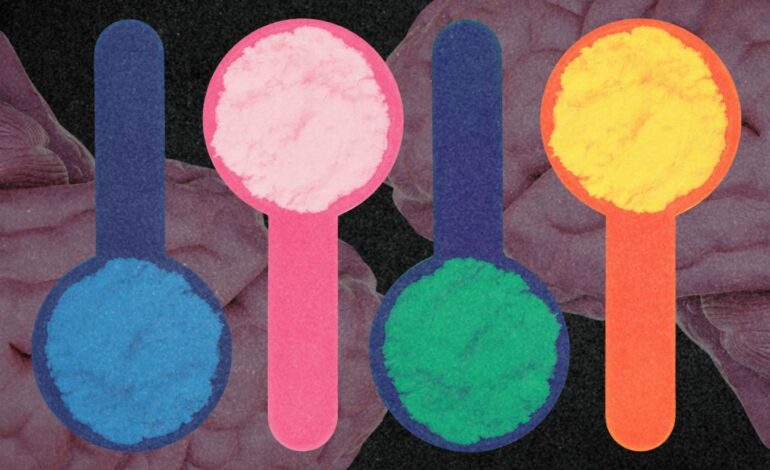New Research Explores Creatine’s Potential to Enhance Brain Function

Recent investigations into the cognitive benefits of creatine supplement have emerged, suggesting this compound may play a vital role in enhancing brain function. While creatine is widely recognized for its ability to improve physical performance, researchers are now examining its potential to bolster cognitive resilience, particularly as individuals age or face stressful situations.
The human brain accounts for approximately 20% of the body’s resting energy expenditure, making efficient energy management crucial for optimal cognitive performance. Matthew Taylor, associate professor of dietetics and nutrition at the University of Kansas Medical Center, emphasizes that creatine may help counteract energy deficits in the brain that worsen with age or injury. “There’s good reason to think scientifically that creatine benefits the brain, but those theories need to be tested,” Taylor states.
Understanding Creatine’s Mechanism
Creatine is an organic compound produced naturally in the body and also sourced from certain foods, mainly meat. It plays a key role in energizing cells by replenishing adenosine triphosphate (ATP), the primary energy carrier in cells. When ATP is used, it loses a phosphate group, and creatine quickly donates a phosphate to regenerate ATP. This process occurs billions of times per second, particularly during high-energy demands.
As people age, the brain’s efficiency in utilizing creatine decreases. Mitochondria, the energy-producing structures in cells, begin to deteriorate, leading to cognitive decline. “Older brains become more energy-starved because they don’t produce or use energy as well,” Taylor explains. Supplementing with creatine could potentially offset these metabolic changes, contributing to better cognitive health.
Dietary Sources vs. Supplementation
Although creatine is found in significant amounts in foods like tuna, salmon, and red meat—herring providing about 1 gram per five-ounce serving—dietary intake alone may not be sufficient for cognitive enhancement. Most dietary creatine is directed toward muscle tissue rather than the brain. Research indicates that vegetarians may maintain similar brain creatine levels compared to meat-eaters due to the brain’s ability to produce creatine independently.
However, studies show that when vegetarians increase their creatine intake through supplementation, they experience improvements in markers of short-term memory. Standard creatine supplementation is typically around five grams per day, equivalent to the amount found in about five pounds of cooked chicken. Some researchers, like Darren Candow of the University of Regina, suggest higher doses may be more effective for cognitive purposes.
The blood-brain barrier, a protective layer around the brain, complicates the absorption of creatine. Higher dosages may enhance the likelihood of creatine penetrating this barrier, allowing it to exert its beneficial effects on cognitive function.
Potential Benefits for Cognitive Health
Evidence suggests that creatine supplementation could protect against cognitive decline related to aging and specific stressors. Studies indicate that creatine may mitigate cognitive issues following sleep deprivation, with young adults who consumed 25 grams of creatine performing better on memory tests after being awake for 21 hours.
Moreover, preliminary research indicates creatine may offer protective effects against more severe cognitive stressors, such as strokes, potentially reducing their severity by 30-50%. Taylor’s pilot study on patients with Alzheimer’s disease found promising results, with some symptoms improving after daily doses of 20 grams of creatine.
While the evidence is compelling, more extensive research is necessary. A review in 2018 tentatively concluded that creatine could improve short-term memory and reasoning, and subsequent studies have reported similar findings, including slight increases in IQ levels.
Risks and Recommendations
Research on the safety of creatine supplementation shows minimal side effects at lower doses. The most studied form, creatine monohydrate, has a strong safety profile. Mark Tarnopolsky from McMaster University notes, “Major side effects are unlikely,” although he cautions that higher doses may carry more risks.
Concerns about kidney damage from creatine use are largely unfounded for typical users. Some rare cases in children with impaired creatine synthesis have reported kidney stones from high doses, but this is not common. Long-term high supplementation may lead the body to produce less of its own creatine, but experts like Candow believe that normal physiological processes would resume after discontinuation.
Creatine is commonly consumed by mixing powder with water or other liquids. Taking it with a small amount of food may help mitigate any potential stomach discomfort.
Future Research Directions
Ongoing research is exploring the potential of creatine supplements during pregnancy to protect fetal brain development. Stacey Ellery at the Hudson Institute of Medical Research is investigating whether creatine can shield developing brains from oxygen deprivation, with promising results observed in animal models. Clinical trials in humans are anticipated to begin soon.
In addition to cognitive health, creatine may offer benefits for new mothers, potentially aiding in recovery from pregnancy-related challenges, including mood disorders and sleep deprivation.
While creatine supplementation shows promise, maintaining a healthy lifestyle through regular physical activity, balanced nutrition, and stress management remains paramount for optimal brain health. Taylor concludes, “Preliminary evidence suggests creatine could provide added value, but it will never supersede the impact of a healthy lifestyle.”






